In Acton, rural serenity threatened by planned battery facilities, costlier fire insurance
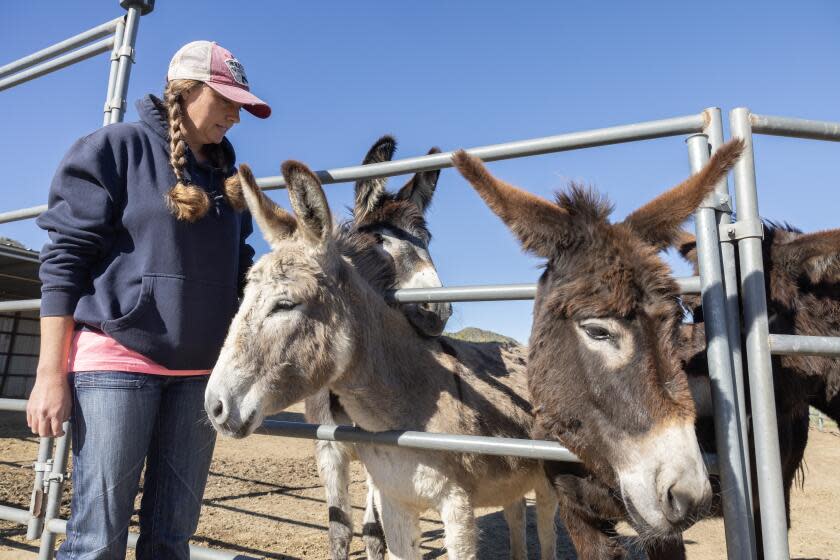
On five acres in Acton, Christina Weyer and her husband care for rescued senior and special-needs equines. At the moment, six horses and 13 donkeys, along with a dog and a clutter of feral cats, share the property.
In this dry, windswept rural landscape dotted with homes and ranches about 50 miles from downtown Los Angeles, wildfires have always been a threat. Insurers have recently hiked premiums to what residents say are unaffordable levels, as climate change worsens the frequency and intensity of the flames.
With a proposal to build a 12-acre lithium-ion battery storage facility, as well as another proposal for a similar facility on 68 acres, residents such as Weyer worry that their slice of rural tranquility could be ruined.
Many fear what would happen if a wildfire from the nearby Angeles National Forest spreads to the battery sites, sending toxic chemicals into the air and potentially threatening the groundwater.
Save Our Rural Town, which advocates for rural communities in the Antelope Valley, is suing the L.A. County Board of Supervisors, which governs the unincorporated community of about 7,300, to stop the 12-acre battery proposal from Chicago-based Hecate Energy. Several Acton residents have donated thousands of dollars to cover the legal fees for what could be a long fight.
Weyer's main concern is for her animals. It would be near impossible, she said, to evacuate them all if a wildfire made it to a nearby battery site and sent toxic fumes their way.
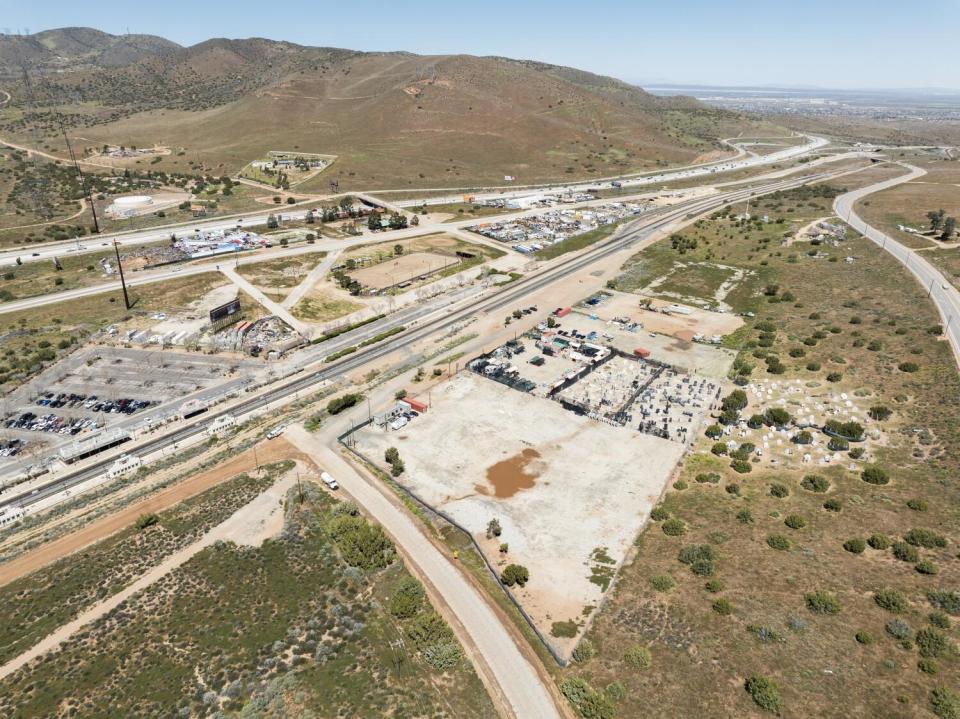
“I do not think [lithium-ion batteries] should be in anybody’s backyard,” said Weyer, whose home sits less than a mile from one of the proposed sites. “But of all the places, why are you choosing somewhere that’s really close to an earthquake fault, and an extremely high fire hazard area, and often very windy?”
Renewable energy developers have identified Acton's open spaces as prime real estate because acres of lithium-ion batteries — often housed in dozens of rows of shipping containers — can be connected to a large electrical substation there.
Energy would flow from wind turbines and solar farms, such as those in the nearby desert, into the batteries, charging them during low-demand times. During peak hours, the companies would then sell the green energy to the regional grid.
Hecate's site, which according to a rendering would have 440 battery containers, could be used to power roughly 250,000 homes, according to a company representative.
"To fulfill that need, Hecate Grid undertakes a very deliberative approach to potential development," said Bobby Howard, a senior manager of development and origination at Hecate Energy. "Any proposed project must fulfill a demand for more energy, prioritize a suitable location that is close to grid infrastructure, include collaboration with private landowners and local governments, and avoid protected environmental or cultural areas."
State and local leaders view battery storage sites as an essential part of ensuring that California can meet its goal of being carbon neutral by 2045.
Supervisor Kathryn Barger, whose district includes Acton, said state officials have made it clear that the batteries are vital to harnessing and storing power, and L.A. County is "behind the eight ball on that."
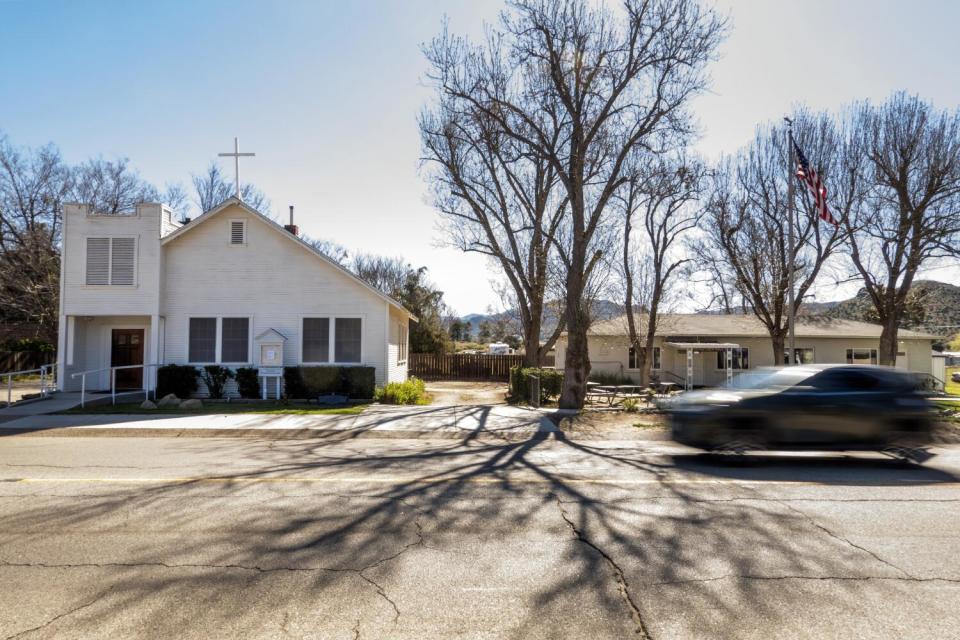
At the same time, location "is going to be important — I don’t want a high concentration in one area," Barger said.
Gov. Gavin Newsom recently visited a battery storage and solar facility in Winters, a small city west of Sacramento, to celebrate that California has increased its battery capacity by 1,250% since he took office in 2019.
“Our energy storage revolution is here, and it couldn’t come at a more pivotal moment as we move from a grid powered by dirty fossil fuels to one powered by clean energy," Newsom said.
As part of Newsom's energy road map, lithium-ion batteries are being added to the state's electric grid at a rapid rate, with companies creating the infrastructure for the first several thousand megawatts over the last few years and making plans to install many times more over the next two decades. As the number of batteries grows, "so does the urgency to address safety," a report commissioned by the California Public Utilities Commission said.
With proper engineering, lithium-ion battery storage sites are safe and pose little risk of starting a fire, said Shirley Meng, a molecular engineering professor at the University of Chicago who is an expert on batteries and studies ethically sourced, recyclable materials for energy storage.
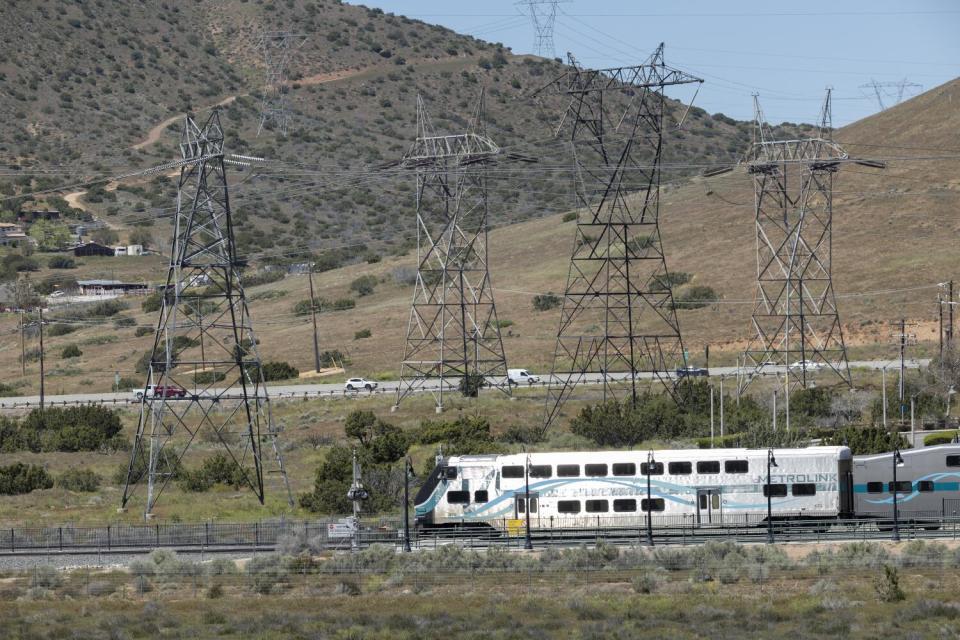
Lithium-ion batteries in smartphones have caught fire spontaneously, as in 2016 when Samsung announced a global recall of its Galaxy Note 7. The technology has improved since then, and the failure rate is now about 1 in 10 million for all types of lithium-ion batteries, Meng said.
She noted, however, that "when something bad happens, it's a catastrophe."
And the threat of groundwater contamination if a wildfire spreads to a battery site is real, because of the chemical compounds in the batteries, she said. (The headwaters of the Santa Clara River are near Acton.)
Howard said that there have been no incidents at Hecate sites and that safety features include 24/7 monitoring for fire, smoke and gas as well as systems controlling temperature and ventilation.
The Acton project would also include "seismic bracing, safety zones around the perimeter, substantial setbacks from parcel boundaries, gravel breaks and a masonry wall around the facility," Howard said.
Acton residents are familiar with the risks that are the downside of life in a place with poppy-covered mountainsides and striking views of the Antelope Valley.
Their community is about seven miles from the San Andreas fault.
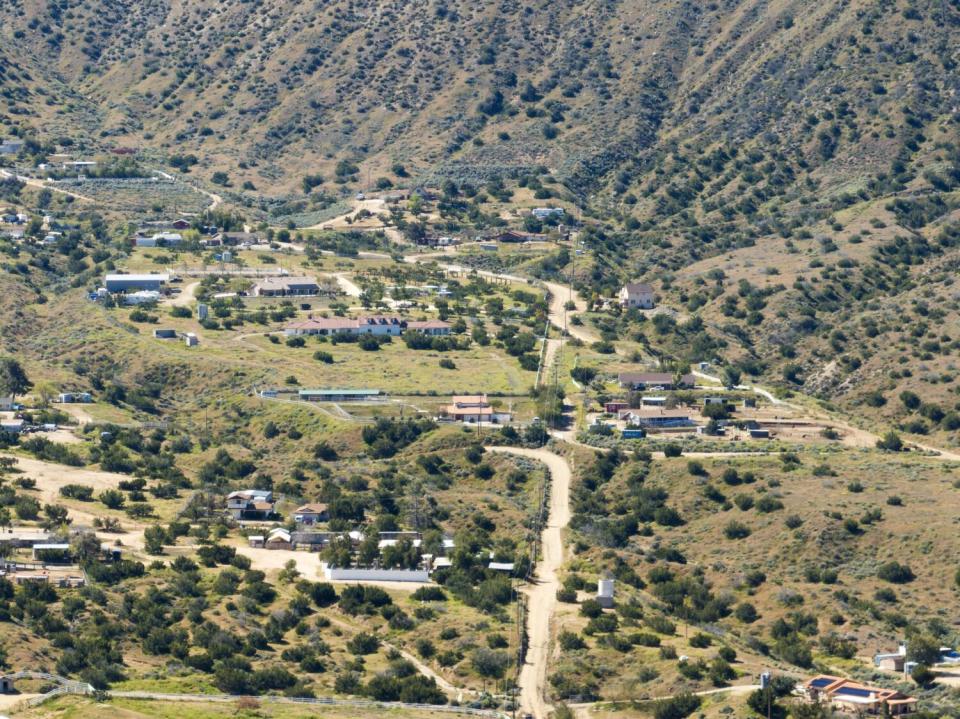
Its wildfire risk is higher than 97% of communities in the U.S., according to Wildfire Risk to Communities, an awareness effort led by the U.S. Forest Service.
They include Paradise, which was devastated by the Camp fire in 2018, and Malibu, which regularly burns in wildfires.
When strong winds are in the forecast for communities at high risk of wildfires, utility officials shut off the power as a precaution. Acton residents have endured several Thanksgivings with no power. Many use wells for water and must rely on generators to run their water pumps when the power goes out.
In recent months, some residents have gotten letters notifying them of huge increases in their fire insurance premiums.
Chris Chacon, a real estate agent, and his wife moved to Acton in 2019 so they could have space for their two horses, Thor and Scooter.
At the behest of their insurance company, the Chacons cleared 30,000 pounds of brush and created a five-foot buffer around their home so it could be certified as "wildfire prepared."
"I get the certification, I turn it in, and [my agent] is like 'OK, cool, you're gonna get renewed, but your annual premium is going from $2,600 to $8,800,'" Chacon said.
For some Acton residents, any added fire risk from a battery storage facility would be the last straw.
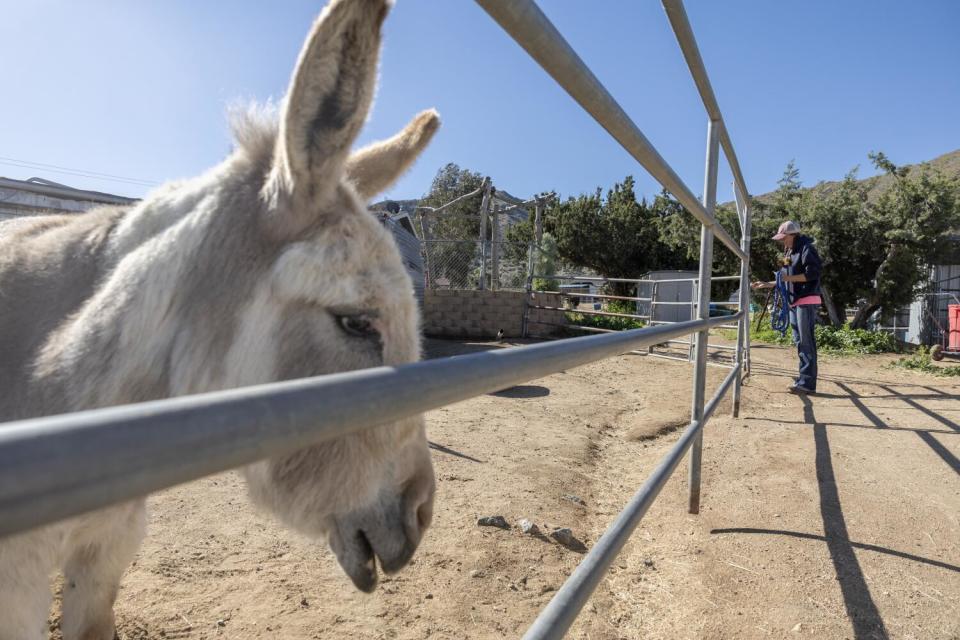
Ruthie Brock runs the Acton Takes Action community task force, which is campaigning against the facilities and supports the group suing L.A. County.
A retired hairstylist and salon owner nicknamed "Ruthie Brockovich" for the environmental activist portrayed by Julia Roberts in the 2000 biopic, Brock has lived in the community for 32 years.
"This is the fight of our life right now," Brock said. "If it goes through, it opens the door to all the other facilities that are trying to come in and would industrialize our rural community."
Working with Jacqueline Ayer, an Acton resident and environmental engineer conversant in the technicalities of the proposed project, Brock marshaled about 40 community members to plead their case at an L.A. County Board of Supervisors meeting in December.
Many in the group wore T-shirts that said "Don't BESS With Acton," an acronym for "battery energy storage system."
The Hecate project had already received approval by county planners to move forward in the process, which includes submitting a building plan and several other steps that will be adjudicated by officials from the fire department and the building and safety department.
At the meeting, L.A. County Fire Chief Anthony C. Marrone said his agency won't approve any project if it is unsafe and doesn't meet fire code and national standards.
"Even if you are in the very high or high fire severity danger zone, we're going to make sure that we put things in place to make sure that the communities are not at risk," Marrone said.
The initial approval process by L.A. County did not require a public hearing, a key issue raised in the Save Our Rural Town lawsuit, and the lack of community involvement remains a sore point.
Hecate's Howard said the company has tried to engage with residents by hosting community events, sending mailers and making phone calls.
Another proposed battery storage facility run by a California company, Avantus, would be built on 68 acres of agricultural land stretching about a mile long, meandering among ranches and homes. The proposal would probably require public hearings, because the property would need to be rezoned.
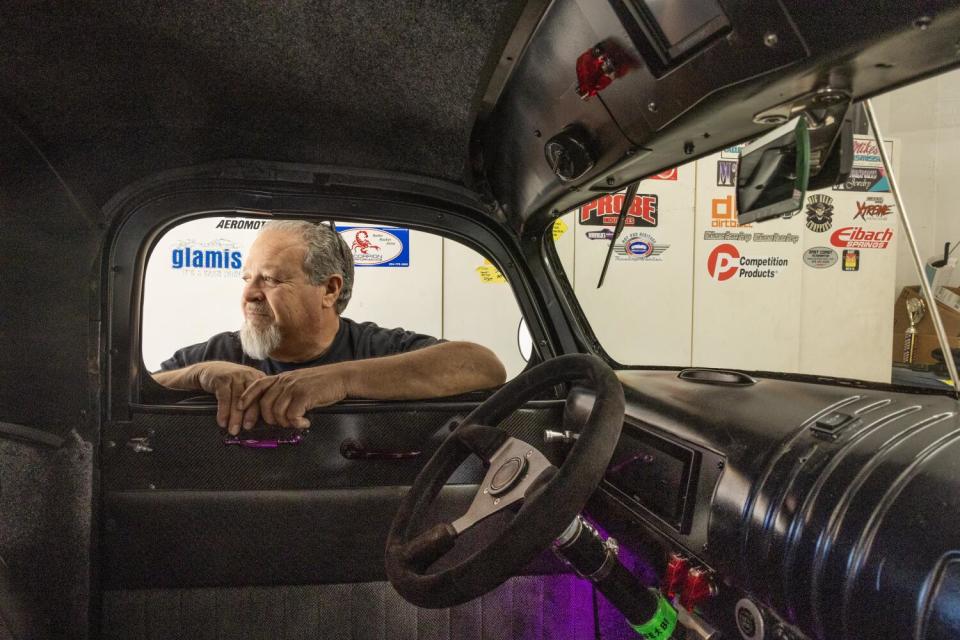
Steve Kaplan, a retired elevator inspector who has lived in Acton for 28 years, has dealt with the power shutoffs, and his insurance premium recently increased by $980.
Kaplan, 63, had planned to stay in Acton for the rest of his life — but not if a battery facility comes to town.
"If they put the battery thing in, I'm putting my house up for sale," he said. "I'm thinking Montana, maybe the upper part of Arizona, but I'm not going to stay here."
This story originally appeared in Los Angeles Times.


